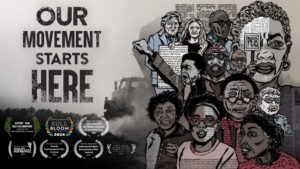
Photo courtesy: John Rash
“Our Movement Starts Here,” a film by University of Mississippi Professors Melanie Ho and John Rash, will premiere Thursday, Sept. 19 at 6 p.m. the Overby Center for Southern Journalism and Politics auditorium.
The documentary tells the story of the 1982 polychlorinated biphenyl (PCB) protest participants in Warren County, N.C. and follows their journey as they continue the fight for environmental justice.
The showing of the film will be followed by a Q and A featuring Dollie Burwell and Reverend Ben Chavis — two leaders of the environmental justice movement who are featured in the film.
Rash, a UM professor of film production and southern studies, initially wanted to make a contemporary environmental justice film. When he discovered another crew with more funding was working on his same intended project, he knew he needed to pivot.
Rash recalled the subtle hints of Warren County mentioned in his research and investigated further into the subject.
“I went to Warren County, and I realized there was this story of the birth of the environmental justice movement that was sitting there for 40 years that no one had made a film about,” Rash said. “There wasn’t a book about it. It had only been covered sort of as an aside. … So I thought what a great opportunity to take an attempt at telling a story for the first time.”
The story, unknown to many, is that of the citizens who engaged in seven weeks of civil disobedience in 1982 to protest against the dumping of over 7,000 truckloads of PCB contaminated soil in the Warren County landfill. Although the protests were unsuccessful in blocking the landfill, Warren County is now regarded as the birthplace of the environmental justice movement.
Rash spent two years cultivating contacts within the community before inviting Melanie Ho, professor in UM’s Center for the Study of Southern Culture, onto the project. The film faced some production setbacks during the Covid-19 pandemic, but the timing delay worked in their favor. Rash, Ho and a group of UM Master of Fine Arts in Film candidates traveled to North Carolina for the 40th anniversary of the protests to capture content for the film in 2022.
“Honestly, it was one of my best experiences,” Ho said. “I think documentary filmmaking should be more collaborative. This was an opportunity for students to go beyond Oxford to get experience doing real fieldwork. It was as valuable for us as their professors to be with them during the process.”
The week of 40th anniversary events, titled “We birthed a movement,” served as the passing down of the movement to a younger generation of activists.
Rash credited this as inspiration for the film’s title.
“The title is meant to reflect sort of a relative here,” Rash said. “When you’re talking about the story (in) 1982, it’s about Warren County, and it’s their movement, but these issues exist all around the world. They exist in Mississippi. They still exist in North Carolina. And those folks, they also have their movement, right? And their movement can start today.”
Reverend William Kearney works as associate minister and health ministry coordinator at the United Shiloh Baptist Church Association in Warren County. Kearney will not attend the Oxford showing but hopes it impacts the audiences who view it.
“I hope the documentary has a personal effect on those who watch it,” Kearney said. “We all value living in safe spaces and not being exploited. After having this connection with the film, I hope it leads people to actions. Those of us that have been disadvantaged and those that are privileged will ask, how can I help? And we can realize it’s not us versus them, but it’s us together that can make a difference.”
Barnard currently houses the University of North Carolina Libraries exhibit “We birthed a movement,” which displays several archival photographs and newspaper clippings from 1982. The exhibit is open for viewing until Nov. 22, 2024.



























